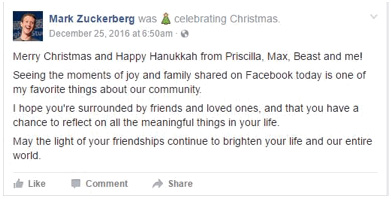Facebook's Mark Zuckerberg Now Thinks Religion Is “Very Important”
“I was raised Jewish and then I went through a period where I questioned things, but now I believe religion is very important.”

If someone were to ask what you know about the faith of Mark Zuckerberg, chances are you'd say that he's an atheist. Indeed, that was once true—but it appears that the Facebook founder has changed, and has embarked on a journey toward God.
This year on December 25, Zuckerberg said that he was “celebrating Christmas” and posted a cheery holiday greeting on Facebook from himself, his wife, their daughter and their dog which began:
“Merry Christmas and Happy Hanukkah from Priscilla, Max, Beast and me.”

Zuckerberg's followers responded with well-wishes of their own; but one commenter remembered Zuckerberg's claim, which once appeared on his personal Facebook page, that he was an atheist. “But Aren't You Atheist?” that commenter asked.
Zuckerberg—who is known for his good-natured and candid interaction with other Facebook users on his wall—responded, explaining:
“No, I was raised Jewish and then I went through a period where I questioned things, but now I believe religion is very important.”
Zuckerberg was raised in a Reform Jewish household. With his devoted parents, he attended Temple Beth Abraham in Tarrytown, New York, where he studied at a religious school and made his bar mitzvah. But what does he believe now? It's not clear exactly what he means—what “religion” is important to Mark Zuckerberg.
Christian Times reported that in October 2015,
...he posted a photo of himself praying at Wild Goose Pagoda in Xi'an China. He said that he offered a prayer for his wife Priscilla, who is a Buddhist. He described Buddhism as “amazing religion and philosophy,” and he said that he is interested in learning more about it.
Earlier, in 2010, Zuckerberg had attended the Wisdom 2.0 conference which is dedicated to “living mindfully in the digital age.” Afterward, he invited academics from Berkeley, Yale and Stanford to teach his company about the Buddhist-inspired concept of compassion.
And more recently, in August 2016, Mark and his wife Priscilla met with Pope Francis at the Vatican, where he gave the Pontiff a model of a Facebook drone that will help developing countries by expanding internet connectivity. In a Facebook post after the meeting, Zuckerberg expressed admiration for the Pope, writing,
“We told him how much we admire his message of mercy and tenderness, and how he's found new ways to communicate with people of every faith around the world.”
Apparently, Zuckerberg is keeping an open mind about faith, and is interested in scoping out the field. In Summer 2015, he announced that his selection for his Facebook book club, which recommends a new book every two weeks, was William James' The Varieties of Religious Experience.
As a seeker, though, Zuckerberg might find James' focus on direct personal religious experience over theology unhelpful. William James believed that mystical experiences could have what he called “morbid origins”—that is, they could be the result of a high fever or pharmaceutically induced hallucinations. On the plus side, however, William James was critical of scientists who were skeptical of things unseen. In James' worldview, the ineffable was as much a part of reality as the physical. James wrote:
Your whole subconscious life, your impulses, your faiths, your needs, your divinations, have prepared the premises, of which your consciousness now feels the weight of the result; and something in you absolutely knows that that result must be truer than any logic-chopping rationalistic talk, however clever, that may contradict it.
As Mark Zuckerberg is propelled forward in his search for truth, my prayer is that he will explore the Catholic faith which he experienced during his Vatican visit just a few months ago. There are so many great texts which he could read and then introduce to readers in his Facebook book club, but let me suggest just two: First there's Patrick Madrid's classic Why Be Catholic? Ten Answers to a Very Important Question, with a foreword by Cardinal Sean O'Malley. And given Zuckerberg's strong sense of social responsibility, perhaps he'd appreciate William Donohue's Why Catholicism Matters: How Catholic Values Can Reshape Society in the Twenty-First Century.













